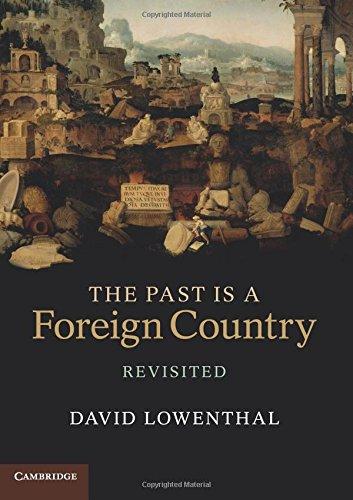Book review: The Past is a Foreign Country – Revisited by David Lowenthal
Submitted by bborghese on

Reviewed by Graham Voce
Cambridge University Press, 2015
ISBN 978 052 161 885 0 (paperback) / 978 052 185 142 8 (hardback)
This is not a straightforward conservation book. This book is focused on the past, concepts of the past and the variety of pasts that we perceive, as well as our relationships with these and how we wish to be aware of them, engage with them and value them. The author, David Lowenthal, writes incisively from outside the centre of the conservation profession and sheds essential raking light on attitudes, morals and mores, giving essential context and rationales to more familiar conservation treatments and techniques, analysis, science and preventive and interventive approaches.
This reviewer must relate, firstly, that David Lowenthal was awarded and delivered IIC’s Forbes Prize Lecture in 2010 and, secondly, that, as a member of the audience for that lecture, I found that Lowenthal brought fresh angles, unexpected questioning and some radical new thinking that were entirely welcome; this fresh approach suffuses ‘The Past is a Foreign Country – Revisited’.
The book is in itself a revisiting of the first iteration of this title, The Past is a Foreign Country (Cambridge University Press, 1985), which famously first opened up our concepts of ‘heritage’, ‘patrimony’, the past (or pasts) and the remembering, and conservation of, these pasts. This first book gave essential depth to thinking around much heritage conservation and cultural historical thinking in the 1980s and 1990s, and its almost deconstructive approach to history took heritage discussions in new, broad and sometimes unexpected directions. He also encapsulated that thinking of the past as ‘foreign’ or strange’ – and that, as a writer from outside conservation per se, that first book opened up new angles into the heart of our concepts of ‘heritage’, ‘patrimony’, and the past.
So why re-visit and re-write? The title itself is a quote from L P Hartley’s 1953 novel The Go-between, and Lowenthal includes in his introduction to this second version, “How my past became foreign”. This is a revising, a revisiting, by the author of his initial points in the light of his own ageing and in the light of new technologies. He covers, as in the first iteration, Wanting the Past, then Disputing the Past, Knowing the Past, Remaking the Past and then, as an epilogue, the Past in the Present. Although illustrating how his move to the UK from the USA affected his own view of how the past and history / heritage are perceived, the book also shows how recent changes in technology change the way we see – and perceive and want - the past, and how that our once-familiar pasts, for us all, are now foreign. How foreign now seem black-and-white television and films, vinyl records, how foreign a world without computers and IT to frame life, how foreign those past, recent, times seem when perceived through these new technologies. Lowenthal: “Ageing shifts the balance between our own and other peoples’ memories”.
So is this approach of use to conservation professionals? Of interest? Of relevance? There are things that this book will not help with: processes of conservation or restoration or the science behind corrosion or the chemistry behind a particular pigment, for example. But in giving a context to conservation work of any type, in providing insights into the ways the past is seen, has been seen, and how the past is analysed (and why), this book is invaluable.
As Lowenthal notes, “This book has multiple points of departure and destination” – and if one is uncomfortable with the very wide range in the approach of a hugely energetic polymath, then this is not a book for you. Sometimes the book reads as the most magnificent discursion on a fascination with the past. But, if one sees the role of conservation as the retention and valuing of as much output of human endeavour as we can, so that we may treasure, wonder, learn and move on, then this is a superb survey. Covering almost the whole field of what we as a species have made, good and bad, and how we deal with this making and its outputs (or indeed how we do not deal with them), this is a book of great range and richness and offers an intensely personal view that always informs and challenges.
Lowenthal’s sheer energy, his depth of coverage and his insights are accessible, fascinating and essential reading.
Graham Voce is IIC’s Executive Secretary, responsible for the IIC’s Office’s day-to-day workings. Since taking on this role in 2004, Graham has been involved with most of IIC’s activities including working with the organisation of (to date) five IIC Congresses and three Student & Emerging Conservator Conferences, as well as other IIC events, activities and publications. Graham studied both Landscape Architecture and English Literature to BA (hons) degree level, is a Fellow of the Society of Antiquaries of London and a member of a number of heritage organisations; he has also been involved in a televised conservation architecture and building project. Based in London, Graham previously worked as the Office Manager of a leading not-for profit sector recruitment agency and, before that, in publications and video editorial work in the world of corporate finance.